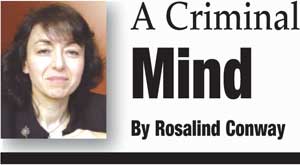The Law Society of Upper Canada’s new paralegal rules were about to have a dramatic effect across Ontario, until Convocation met on Oct. 25 and clarified new Bylaw 4. Criminal lawyers in Ottawa, Toronto, and across the province were becoming concerned that they could no longer send their assistants to court to set dates for them. The situation was most acute in the larger urban areas.

The Ottawa criminal defence bar sighed relief. Many of them have relied on co-op criminology students to assist them with remands for the past decade and more. This change, from relying on articling students to taking on university students, coincided with the cuts to the Ontario Legal Aid Plan in the early 1990s.
Of concern was the wording of new Bylaw 4, which stated that anyone appearing before a court or tribunal must have a paralegal licence, unless that person is covered by an exemption. There were exemptions for articling students and for law students working for student legal aid, if supervised by a lawyer.
Many exemptions were in place for assistants working with various levels of government. Municipal prosecutors and employees of Legal Aid Ontario were exempted. Legal secretaries working for the federal and provincial Crown were permitted to appear, but those employed by private defence lawyers would not have been able to appear, without new Bylaw 7.1.
Ottawa lawyer Heather Perkins-McVey is to be credited for having identified this issue. It had slipped under the radar. Heather has been one of the supporters of the Carleton University placement program.
The Carleton students are primarily pre-law students, selected by the university for their academic prowess. For them, the set-dates are their first hands-on experiences speaking to matters in court, and the work increases their confidence and helps them decide if criminal practice is for them. They sit for hours waiting to speak to matters, but they get to soak up the experience of being in court.
Ideally, articling students should be doing this work. But employing the students is the reality of criminal practice. Criminal lawyers are often unretained or under-retained, and their alternative is to slip a note to duty counsel, but they generally prefer to send a warm body down to court who will come back and report directly to them.
For those sending unlicensed agents to court, I do have a caveat, because your agent can only appear on summary conviction matters to deal with scheduling or routine administrative matters, according to new Bylaw 7.1. The lawyer must give the “non-licensee” express instructions and authorization. In other words, the unlicensed paralegal assisting the lawyer in private practice cannot take any steps in the matter. The non-licensee should not do a pre-trial.
Another wrinkle may need to be ironed out. Although Bylaw 4 talks about paralegals appearing on summary matters, the law society web site’s October 2007 “Paralegal Questions & Answers” indicates that only the least serious summary matters, punishable by up to six months of imprisonment, are to be dealt with by licensed paralegals.
Section 800 of the Criminal Code is cast broadly. It permits agents to appear on all summary conviction matters. There are many common hybrid offences that carry up to 18 months of imprisonment if the Crown proceeds summarily: assault causing bodily harm, uttering a death threat, and sexual assault, for example.
There is another can of worms that I hesitate to open - but in the interest of having an even playing field between the defence and Crown, and while we are in the midst of redefining what non-lawyers may do in court, what about remands being done by the Crown’s secretaries? It has become common in Ottawa, and I suspect in other places, for a non-lawyer to be sent to court to deal with the entire list of summary conviction and indictable matters in remand court.
I am relieved for the Carleton students, and for the future of this worthy program at the university. Most of my former students have gone on to practise law.
In the coming two years, as Convocation revisits this issue, it will be interesting to see what other fine tuning will take place in the area of who can appear as agent, an area which is more complex than it looks.
(Please note: Due to misinformation received, I reported in a previous column that the jury nullification bill was passed in New Hampshire. In fact, it was rejected.)
Rosalind Conway practises criminal law in Ottawa. She can be reached at [email protected]

 The Ottawa criminal defence bar sighed relief. Many of them have relied on co-op criminology students to assist them with remands for the past decade and more. This change, from relying on articling students to taking on university students, coincided with the cuts to the Ontario Legal Aid Plan in the early 1990s.
The Ottawa criminal defence bar sighed relief. Many of them have relied on co-op criminology students to assist them with remands for the past decade and more. This change, from relying on articling students to taking on university students, coincided with the cuts to the Ontario Legal Aid Plan in the early 1990s.